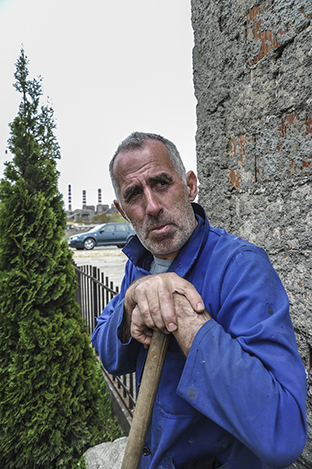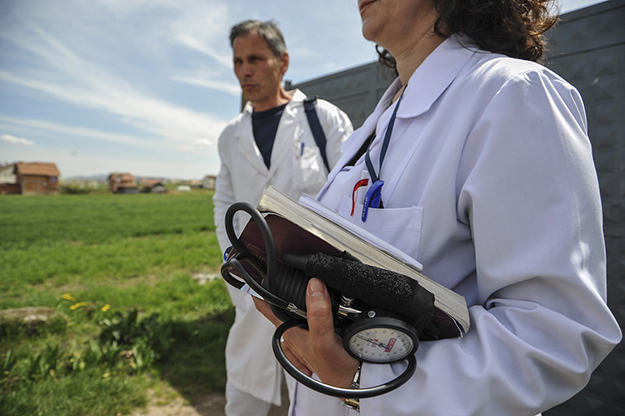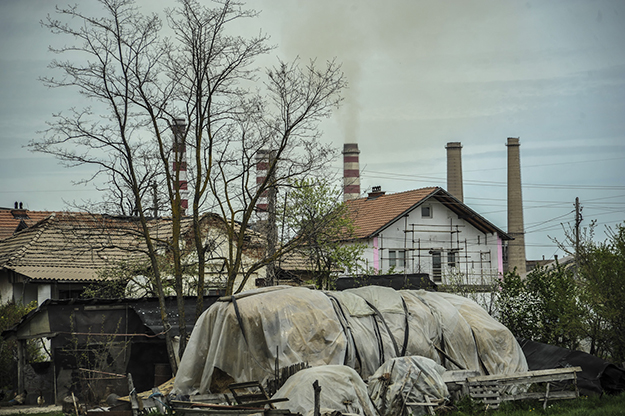Editorial note: This article was originally published in Kosovo 2.0’s Green Issue print magazine in 2015.
Dressed in his work uniform, Vesel Mexhuani looks after his garden in the village of Dardhishte in Obiliq. The smoke coming out of the power plant only two kilometers away does not affect this 60-something man much.
Dardhishte, a village with about 1,500 residents, has been a mining zone for underground coal since 1922. In 1962, Energy Corporation of Kosovo (KEK) workers started extracting coal for the production of electric energy. Mexhuani has been working as a machinery manager with KEK for 30 years, but for his family, and for the residents of Obiliq, this means living in one of the most contaminated regions in the country. KEK is the only energy enterprise in the country, and is simultaneously its biggest polluter.
Residents of this region have suffered numerous health problems from the contamination of the soil, water and air. The World Health Organization (WHO) classified air pollution as a carcinogen in October 2013, proving it to be a worldwide environmental problem and public health concern.
The municipality of Obiliq has one of Kosovo’s highest rates of cancer diagnoses. In one decade, Mexhuani says that five members of his family have passed away as a result of cancer, and some of his relatives chose to migrate from Dardhishte to other towns.
Gazmend Zhuri, a pulmonologist, and Iliriana Bajraktari, an internal medicine specialist, conducted research on the link between pollution and cancer that found that Obiliq has the highest rate of cancer patients in a comparison with the regions of Prizren and Prishtina, where Zhuri is a tuberculosis officer for WHO. The parallel between Prishtina and Prizren was drawn because, without presence of heavy industries like mining, the Prizren region is considered to have some of the purest air in Kosovo, unlike the Prishtina region, which is subject to pollution from power plants.
Zhuri said that discharge papers and bronchoscopy reports from the Pulmonology Clinic at Kosovo Clinical and University Center (KCUC) and from Regional Hospital Prizren were analyzed between 2006 and 2010. Obiliq had the highest cancer rate with 27.84 cases per 100,000 residents, whereas the lowest rate was in Kacanik, with 2.99 cases per 100,000 inhabitants. According to the study, the municipality of Prizren also has a low rate, with 4.49 cases per 100,000 residents, while Pristina has 19.94 cases per 100,000 people.

The Maxhuni family live in one of Kosovo’s most contaminated regions. Residents of Obiliq suffer from numerous health problems as a result of polluted soil, water and air. Photo: Atdhe Mulla / K2.0.
In Prishtina, Zhuri said, pollution is far more present than in the Prizren region.
There have been few efforts by KEK to address pollution and reduce the release of ash. In 2013, new electric filters were installed on three units of the Kosovo A power plant, aiming to reduce of the release of ash from 600 mg/Nm³ (milligrams per 1 normal cubic meter) to 50 mg/Nm³. According to KEK officials, 50 mg/Nm³ is the permitted European standard of release of ash.
According to data from KEK, the release of ash from these units in 2012 ranged from 469 mg/Nm³ to 728 mg/Nm³. Measurements in 2014 showed a drastic reduction, with rates ranging from 53 mg/Nm³ to 59.2 mg/Nm³.
However, the area called Kodra e Hirit (Ash Hill), which serves as the coal waste landfill near the mine in Dardhishte, continues to cause problems. As part of the goal to adopt a more protective approach toward the environment, KEK has started to replant Ash Hill in order to turn it into a green zone. This plan includes planting 150,000 new seedlings.
But residents there say problems persist. “When the north wind blows, the ashes fill our gardens,” Mexhuani said.
Cancer rampant
Seven kilometers from Dardhishte, in the village of Mazgit i Ulet in Obiliq, the Podvorica family is having a hard time. F. Podvorica is receiving chemotherapy treatment for lung cancer, which was diagnosed by the Oncology Institute of KCUC. In 2011, his father, Ferat Podvorica, died of lung cancer.
Last year, 18 new cases of cancer were diagnosed and 31 new cases of respiratory system complications were reported at Main Family Medicine Center (MFMC) in Obiliq. This center provides primary health care through family medicine for the approximately 2,500 residents in the municipality.
“These diseases are more present than in other municipalities. During just the first three months of 2015, we have diagnosed seven new cases of cancer,” said the center’s director, Atifete Shulemaja.
According to Ekrem Hyseni, the director of the Oncology Institute at KCUC in Prishtina, that clinic diagnosed 190 new cases of cancer in that same time. “Out of those, 52 were breast cancers, 35 respiratory system cancers, 32 gastrointestinal cancers, 39 urogenital and gynecological cancers and 32 were cancers of other systems,” Hyseni said.

People living close to mines and power plants are more prone to respiratory and cardiovascular diseases ; in Obiliq, cancer diagnoses are particularly high. Foto: Atdhe Mulla / K2.0.
While the Pulmonary Clinic at KCUC does not have comparative statistics on respiratory diseases by municipality, Ilirjana Raça-Bunjaku, director of the clinic, said that most cases there have to do with diseases manifested through the closure of the lower respiratory tract. These diseases, according to Raça-Bunjaku, are characterized by limited air circulation through respiratory channels.
“Limitation of air circulation is progressive and is followed by an inflammatory reaction of the lungs caused by hazardous particles and gases,” she said. “Risk factors are air pollution, environments where we live and work, as well as frequent respiratory infections.” In 2013, 196 patients with these kinds of problems received treatment at the Pulmonary Clinic at KCUC, and that number dropped slightly in 2014 to 188.



People in Kosovo are dying from the depleted uranium dropped on it in 1999...
what a bunch of ugly lies. Kosovo will be decimated by the depleted uranium and plutonium waste spent after the bombing of Kosovo during the war. after deliberately giving all these people a contaminated environment they are all sure to die of cancer in and have deformed babies the war criminals are trying to blame their crime against humanity on 'old equipment' and a little shit in the sewage. bullshit. criminals. liars. ugly misinformation campaign. they are dying of cancer because they were deliberately targeted with WMDs.